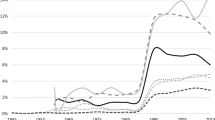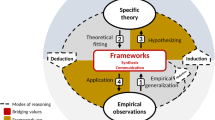Abstract
Although Spector and Kitsuse’s Constructing Social Problems (CSP) is often credited with launching constructionist theory, this obscures the contributions of other sociologists pursuing parallel lines of research. CSP’s advocacy of a strict constructionist position has largely been ignored by constructionist researchers. Although some conflist-oriented socioogists argue that it is time to move beyond constructionism, it remains the best-developed theory of social problems. At the same time, it is necessary to develop the theory in new directions, particularly by synthesizing case studies.
Similar content being viewed by others
Notes
These are my terms (Best 1989). I borrowed the term strict constructionism from Richard Nixon, who as president, said that he was seeking to nominate strict constructionist judges to the Supreme Court. It was a way of poking fun at what I saw as an untenable stance. To my delight, the label stuck.
References
Becker, H. S. (1963). Outsiders: Studies in the sociology of deviance. New York: Free Press.
Best, J. (1989). Images of issues: Typifying contemporary social problems. Hawthorne: Aldine de Gruyter.
Best, J. (1993). But seriously folks: The limitations of the strict constructionist interpretation of social problems. In J. A. Holstein & G. Miller (Eds.), Reconsidering social constructionism: Debates in social problems theory (pp. 129–147). Hawthorne: Aldine de Gruyter.
Best, J. (2006). Blumer’s dilemma: The critic as a tragic figure. American Sociologist, 37(3), 5–14.
Best, J. (2015). Beyond case studies: Expanding the constructionist framework for social problems research. Qualitative Sociology Review, 11(2), 18–33.
Best, J., & Loseke, D. R. (2018). Prospects for the sociological study of social problems. In A. J. Treviño (Ed.), The Cambridge handbook of social problems (Vol. 1, pp. 169–182). Cambridge: Cambridge University Press.
Blumer, H. (1971). Social problems as collective behavior. Social Problems, 18(3), 298–306.
Currie, E. P. (1968). Crimes without criminals: Witchcraft and its control in renaissance Europe. Law and Society Review, 3(1), 7–32.
Dello Buono, R. A. (2013). Time to change the subject: A new sociology of praxis. Current Sociology, 39(6), 795–799.
Dello Buono, R. A. (2015). Reimagining social problems: Moving beyond social constructionism. Social Problems, 62(3), 331–342.
Erikson, K. T. (1966). Wayward puritans: A study in the sociology of deviance. New York: WIley.
Gusfield, J. R. (1963). Symbolic crusade: Status politics and the American temperance movement. Urbana: University of Illinois Press.
Gusfield, R. R. (1967). Moral passage: The symbolic process in public designations of deviance. Social Problems, 15(2), 175–188.
Gusfield, J. R. (1981). The culture of public problems: Drinking-driving and the symbolic order. Chicago: University of Chicago Press.
Gusfield, J. R. (1985). Theories and hobgoblins. SSSP Newsletter, 17(1), 16–18.
Holstein, J. A., & Gubrium, J. F. (2003). A constructionist analytics for social problems. In J. A. Holstein & G. Miller (Eds.), Challenges and choices: Constructionist perspectives on social problems (pp. 187–208). Hawthorne: Aldine de Gruyter.
Ibarra, P. R., & Kitsuse, J. I. (1993). Vernacular constituents of moral discourse: An interactionist proposal for the study of social problems. In J. A. Holstein & G. Miller (Eds.), Reconsidering social constructionism: Debates in social problems theory (pp. 25–58). Hawthorne: Aldine de Gruyter.
Kitsuse, J. I., & Cicourel, A. V. (1963). A note on the uses of officials statistics. Social Problems, 11(2), 131–139.
Kitsuse, J. I., & Schneider, J. W. (1989). Preface. In J. Best (Ed.), Images of issues: Typifying contemporary social problems (pp. xi–xiv). Hawthorne: Aldine de Gruyter.
Mauss, A. L. (1975). Social problems as social movements. Philadelphia: Lippincott.
Mauss, A. L., & Wolfe, J. C. (Eds.). (1977). This land of promises: The rise and fall of social problems in America. Philadelphia: Lippincott.
Sarbin, T. R., & Kitsuse, J. I. (1994). Prologue. In T. R. Sarbin & J. I. Kitsuse (Eds.), Constructing the social (pp. 1–18). Thousand Okays: Sage.
Schneider, J. W. (1985). Defining the definitional perspective on social problems. Social Problems, 32(3), 232–234.
Spector, M., & Kitsuse, J. I. (1977). Constructing social problems. Menlo Park: Cummings.
Weinberg, D. (2014). Contemporary social constructionism: Key themes. Phiadelphia: Temple University Press.
Wiener, C. (1981). The politics of alcoholism: Building an arena around a social problem. New Brunswick: Transaction.
Woolgar, S. (1981). Interests and explanation in the social study of science. Social Studies of Science, 11(3), 365–394.
Woolgar, S., & Pawluch, D. (1985a). Ontological gerrymandering: The anatomy of social problems explanations. Social Problems, 32(3), 214–227.
Woolgar, S., & Pawluch, D. (1985b). How shall we move beyond constructivism? Social Problems, 33(2), 159–162.
Author information
Authors and Affiliations
Corresponding author
Rights and permissions
About this article
Cite this article
Best, J. The Bumblebee Flies Anyway: the Success of Contextual Constructionism. Am Soc 50, 220–227 (2019). https://doi.org/10.1007/s12108-018-9386-0
Published:
Issue Date:
DOI: https://doi.org/10.1007/s12108-018-9386-0




